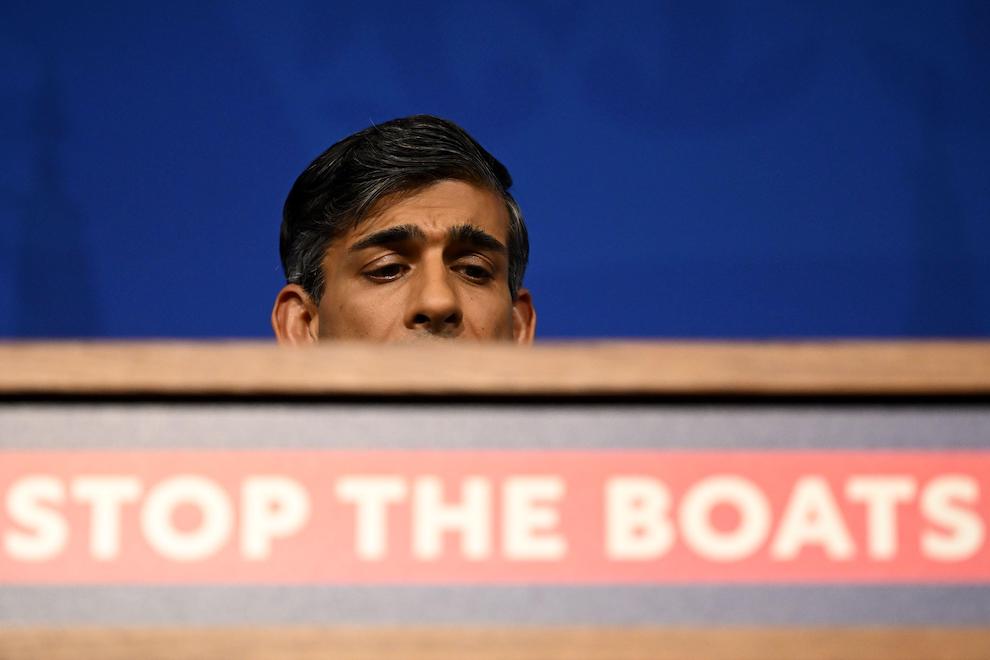The below content first appeared in Politics.co.uk’s Politics@Lunch newsletter, subscribe here and never miss this daily briefing.
Not just one victory for Rishi Sunak in the House of Commons yesterday evening, but 10 — in a row.
MPs voted to reject each of the House of Lords’ many amendments to the Safety of Rwanda (Asylum and Immigration) Bill, with the legislation now ponged back to the upper chamber as according to the usual parliamentary to-and-fro protocol.
Peers, of course, had advised MPs to water down the government’s hardline offering. Amendment two aimed to remove the claim that Rwanda is a safe country until the treaty its government signed with the UK last December is fully implemented. And amendment four would have allowed the presumption Rwanda is safe to be rebutted with credible evidence.


Conservative MP Robert Buckland, a former justice secretary, backed both of these amendments, thus following through on his threat to rebel against the government whip. But, alas, there was no mass one nation uprising — and the bill sails back as written to the Lords.
However, reports today suggest that peers are unlikely to end their attempts to moderate the legislation — despite the commons rejecting their amendments yesterday and Buckland’s advice, issued this morning, that the Lords should not “push the matter too aggressively”.
The news that House of Lords is gearing up for a fight on the government’s flagship legislation will be ill-received in No 10 — which has long pushed for flights to the east African nation as a means of easing the prime minister’s torment.
***A message from Polimapper***
With the post-war record for new MPs under threat at the next election, Polimapper has undertaken the most in-depth study yet into the candidates from which these new MPs will be drawn. For all the insights, download the White Paper.
***
During its initial stay in the Lords, the Rwanda Bill suffered a series of heavy setbacks — with the government subjected to defeats of unusually large margins of about 100. Sunak’s “emergency legislation” looks set to be long-delayed by a lengthy “ping pong” session, then; and during a period when the prime minister seems at his most exposed, no less.
That said, the Lords’ obstinacy is just the latest signal that the Rwanda deportation plan alone is unlikely to save the prime minister.
As we reported yesterday, less than a quarter of the public is said to back the bill unamended. According to the Focaldata research for the think tank British Future, only 24 per cent of the public think the government should try to get the Rwanda Bill through in its current form.
This is compared to six in ten people (61 per cent) — including 55 per cent of Conservative voters — who think the government should have either accepted some amendments to the bill or scrap it altogether.
On top of this, the Conservative parliamentary party is still deeply divided on the proposals. The Rwanda Bill’s House of Commons committee stage in January was characterised by a significant rebellion among Conservative MPs, spearheaded by the former immigration minister Robert Jenrick.
Jenrick, who went on to vote against the bill at its third reading alongside 10 other colleagues, is on the record as saying the bill will not succeed in its stated objective: to get flights off to Rwanda. Jenrick’s thesis suggests that the scheme could still be stalled by ECHR rule-39 injunctions. The problem for the PM is that, in time, his erstwhile ally might just be proved right.
This all explains why the government has shifted its focus to the economy in recent months.
Now, that is not to say that Rishi Sunak’s “stick with the plan” messaging has improved his political prospects. Rather, a duff spring budget ultimately served to deepen — and even entrench — the Conservative Party’s newfound fatalism.
Still, the PM attempted to plough ahead with a speech to a “Business Connect” event on apprenticeships yesterday; and his economic message may soon be sharpened by inflation news on Wednesday and an interest rates decision on Thursday. In this way, shadow chancellor Rachel Reeves’ Mais lecture later today will probably serve to shape the news agenda in the government’s preferred terms.
But the Conservative Party remains restive; MPs are now rolling through potential Sunak successor candidates by the day (security minister Tom Tugendhat is the latest to be touted).
Who will be talked up tomorrow as the Conservative Party’s saving grace? Simply, the psychodrama refuses to abate — Rwanda commons victory notwithstanding.
Lunchtime briefing
Conservative peer claims Rwanda is ‘perfectly safe’ if you don’t oppose the government
Football Governance Bill: Rishi Sunak vows to tackle ‘unscrupulous’ club owners
Lunchtime soundbite
A new chapter in Britain’s economic history. And unlike the 1980s, growth in the years to come must be broad-based, inclusive and resilient
— Delivering the annual Mais Lecture in the city of London this evening, shadow chancellor Rachel Reeves will vow to bring about a “new chapter in Britain’s economic history”
Now try this
‘Sunak braces for backlash as smoking ban bill to be introduced in Commons’
The Guardian reports that a libertarian faction of Conservatives are expected to stage a rebellion.
‘Revealed: George Galloway says he’ll run as Greater Manchester mayor – in 2028’
LabourList reports.
‘Has Johnson gone Caracas?’
ConservativeHome’s William Atkinson on the former prime minister’s recent trip to Venezuela to meet dictator Nicolàs Maduro.












